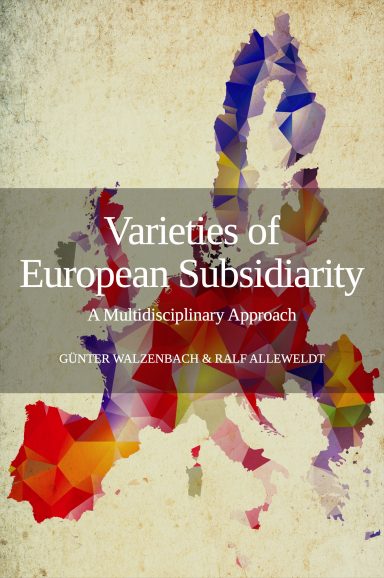Subsidiarity as a principle in favour of decentralised decision-making is a cornerstone of the very legal construction of the EU. Yet, the question of how decision-making powers should be distributed between the EU and the member states is not, or only to a minimal extent, answered in Article 5 (3) of the Treaty on European Union (TEU). This collection draws on social science disciplines to go beyond a purely legal analysis to provide clarity over this principle as applied. With the help of theoretical exploration and empirical case studies the contributors identify significant variation in the implementation of the subsidiarity concept. By tracing the precise location of political authority at different levels of European governance they examine the pressures for effective decision-making despite the changing policy preferences of governments.
Varieties of European Subsidiarity: A Multidisciplinary Approach
Table of contents
Introduction – Günter Walzenbach & Ralf Alleweldt
SECTION ONE: CONCEPT AND THEORY
The Political Philosophy of European Subsidiarity – Peter Rinderle
The Subsidiarity Principle at The Interface of Law and Politics – Thilo Marauhn & Daniel Mengeler
National Parliaments in the EU: Synergy Under the Subsidiarity Principle? – Donatella M. Viola
SECTION TWO: POLICIES
Subsidiarity and The History of European Integration – Giuliana Laschi
Subsidiarity and Social Europe – Rosa Mulé
The Subsidiarity Principle in EU Environmental Law – Sian Affolter
EU Policy on Internal Security and the Subsidiarity Principle – Hartmut Aden
SECTION THREE: MIGRATION
Subsidiarity and Trafficking in Human Beings – Marco Borraccetti
The Subsidiarity Principle and European Refugee Law – Ralf Alleweldt
Subsidiarity Versus Solidarity? EU Asylum and Immigration Policy – Marco Balboni
Global Migration And Local Integration: The European Refugee Crisis – Jörg Dürrschmidt
SECTION FOUR: INTERNATIONAL DIMENSION
European Foreign Policy and The Realities of Subsidiarity – Jörg Michael Dostal
Subsidiarity: A Principle for Global Trade Governance? – Günter Walzenbach
Subsidiarity and European Governance: Export and Investment Promotion Agencies – Maximilian Bossdorf
Subsidiarity and Fiscal Federalism in Canada – Barrie B. F. Hebb
This book amply demonstrates the utility of political analysis for a fuller understanding of the concept of subsidiarity. It offers important insights for students of regional and global governance, particularly for those concerned with the future evolution and political legitimacy of European governance. The volume’s organisation is exemplary, and the editors identify multiple sources of political authority with far-reaching consequences for supranational policy making. They do so without losing sight of the real-life stakeholders at national and local levels.
The editors of this volume reinvigorate the international debate on the role of subsidiarity in theory and practice. Varieties of European Subsidiarity moves beyond legal analysis with a multidisciplinary exploration of the principle in its many empirical manifestations. Despite the focus on EU policy, individual contributions also delve into comparative and international dimensions, offering valuable accounts of key topics in European governance. A rigorous, empirically informed, but critical and new contribution to an important field.
Walzenbach and Alleweldt’s Varieties of European Subsidiarity offers a state- of-the-art account of the complex and politically contested system of multi- level governance in Europe. Those with an interest in the shifting sites of political authority in Europe will greatly benefit from the book’s multidisciplinary insights. It competently explores the legal foundation of the principle of subsidiarity and thoroughly examines practical applications in different policy areas and across EU member states.
The multidisciplinary perspective offered here nicely blends theoretical exploration with practical relevance and includes intriguing case studies as a must read for anyone interested in the workings of the European Union. This book will be an essential source for students and scholars in the Eastern Neighbourhood designing their own processes of decentralisation.
